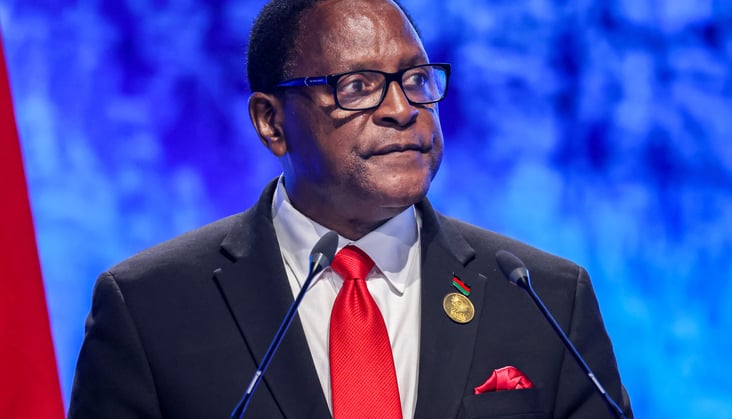By Adeyemi Adekunle
President Lazarus Chakwera has issued a renewed and urgent call for international assistance to tackle Malawi’s worsening food crisis, which has plunged over a quarter of the population into severe hunger. In his impassioned plea during a televised address on Wednesday evening, Chakwera highlighted the dire situation that has left 5.7 million people on the brink of starvation, calling the humanitarian crisis one of the worst the country has faced in decades.
“We are not out of the woods yet,” Chakwera declared somberly, acknowledging the grave challenges that continue to grip the nation. “This is why I continue to lobby for international support to address the humanitarian crisis we are facing.”
The crisis, largely driven by prolonged droughts linked to the El Niño weather phenomenon, has devastated crops across Malawi’s rural heartlands, leaving families to rely on extreme measures for survival. Reports from affected areas paint a harrowing picture: desperate villagers resorting to consuming wild plants such as buffalo beans, which can be toxic without proper preparation.
A Crisis of Unprecedented Scale
According to the most recent Malawi Vulnerability Assessment Committee report, the 5.7 million affected individuals represent roughly a quarter of the country’s total population of 20 million. Rural communities, particularly reliant on subsistence farming, have borne the brunt of the crisis, their livelihoods decimated as rains failed and fields turned barren.
El Niño, a recurring weather pattern that disrupts rainfall and intensifies drought conditions, has exacerbated food insecurity in Malawi. Experts warn that the impact of El Niño on the region’s agricultural systems is becoming increasingly severe, leaving already vulnerable nations like Malawi teetering on the edge of collapse.
The ripple effects of this food shortage are dire. Hunger has forced children out of school, as families prioritize food over education. Clinics and health facilities report rising cases of malnutrition, particularly among children under five and pregnant women, compounding Malawi’s already fragile healthcare system.
Global Assistance Needed Now
President Chakwera’s call for international assistance comes against the backdrop of a previous plea in March, when he sought $200 million in food aid to alleviate hunger exacerbated by the drought. Since then, some progress has been made through contributions from key international partners, but the needs far exceed the resources currently available.
Acknowledging the support received thus far, Chakwera expressed gratitude during his address.
“From the governments of Sweden and Netherlands, the WFP received a donation of $11.8 million,” he noted. “From the government of the United States, the WFP received a donation of $7 million… from the government of Japan, $1.9 million. I say thank you.”
Despite these efforts, Chakwera emphasized the critical need for more assistance to bridge the widening gap in resources.
“If you are out there standing with Malawians and giving them the help they need during this crisis, I can assure you that Malawians are honest and fair-minded people,” he assured potential donors. “They will remember those who brought them food in this season of drought and hunger.”
The U.N.’s World Food Program (WFP), the primary humanitarian agency coordinating food relief efforts in Malawi, echoed Chakwera’s sentiments. Kylie Scott, the WFP’s head of partnerships and communication in Malawi, underscored the urgency of the situation and the funding shortfall.
“At the moment, we have got funding until the end of the year,” Scott told VOA. “But there will be a gap until March 2025. So, we are working really hard to make sure that we can close that gap and make sure that no one gets left behind.”
The funding gap poses significant risks as Malawi’s lean season—the period between harvests—stretches into early 2025. Without immediate intervention, hunger and malnutrition are expected to worsen, placing millions in jeopardy.
Communities in Crisis: Stories of Survival
In Malawi’s rural districts, the food crisis is not just a statistic; it is a lived reality. Reports from villages describe parents rationing meals to ensure their children eat at least once a day. In some cases, entire families survive on foraged wild plants.
John Chisale, a father of five in Malawi’s southern region, described the struggles his family faces daily. “The crops failed because there was no rain. Now we eat buffalo beans we gather from the bush. We know they are dangerous, but we have no choice,” he said.
Buffalo beans, while edible when properly processed, can cause severe allergic reactions if consumed raw or inadequately cooked. Families like Chisale’s are forced to take these risks as hunger overrides health concerns.
At health centers across the affected regions, medical workers report increasing admissions of children with severe malnutrition. A nurse at a rural clinic in Zomba district told reporters that they are overwhelmed. “Children are coming in weaker and thinner every day. We don’t have enough supplies to treat all of them,” she said.
Government and Humanitarian Efforts
To address the crisis, the Malawian government, in collaboration with the WFP and local humanitarian organizations, has ramped up food distribution efforts. Relief packages, which include maize, beans, and cooking oil, are being dispatched to the hardest-hit areas. However, these efforts are hindered by the sheer scale of need and limited resources.
Charles Kalemba, Malawi’s commissioner for disaster management affairs, admitted that the government’s capacity alone is insufficient. “We are working closely with our partners, but we need more support. We are doing our best to reach the most vulnerable, but the crisis is overwhelming,” he said.
The WFP has been instrumental in coordinating aid and reaching communities, but funding constraints continue to hamper their operations. Kylie Scott highlighted that their current resources will only sustain operations through December 2024. “We are at a critical juncture. Without additional support, the progress we’ve made so far could be undone,” she warned.
A Nation at the Crossroads
Malawi’s food crisis is not an isolated incident. Experts argue that it is part of a broader pattern of climate-induced disasters that are increasing in frequency and intensity across sub-Saharan Africa. Climate scientists have long warned that El Niño events will become more destructive as global temperatures rise, and the effects are disproportionately felt in nations like Malawi, where agriculture remains the backbone of the economy.
The country’s reliance on rain-fed agriculture leaves it highly vulnerable to droughts and erratic weather patterns. Combined with underlying issues such as poverty, limited access to technology, and population pressures, the current food crisis highlights the urgent need for long-term strategies to build resilience against climate shocks.
President Chakwera acknowledged this during his address, stating that Malawi cannot continue to rely solely on emergency aid. “We must also look to the future and invest in strategies that will protect us from these crises,” he said. These strategies include improving irrigation systems, diversifying crops, and promoting climate-resilient agriculture.
The Call to Action
As Malawi grapples with one of its darkest chapters, President Chakwera’s renewed plea for international aid serves as a stark reminder of the shared responsibility of the global community to support nations in crisis.
Humanitarian organizations emphasize that the cost of inaction will be measured in human lives. Without sufficient funding, millions of Malawians could face worsening hunger, illness, and even death. The crisis also risks triggering secondary effects, including displacement, school dropouts, and economic instability.
Chakwera’s impassioned appeal is not merely a cry for immediate assistance but also a call for long-term partnerships to address the root causes of hunger. “Malawi is resilient, but our people need help now,” he said. “We need the world to stand with us, not just for today but for the future.”
The international community faces a critical moment: Will it heed Malawi’s plea and step in to prevent further catastrophe, or will millions of vulnerable lives be left to face the devastating consequences of hunger and neglect?
Despite WFP and its partners works to bridge the funding gap, the fate of Malawi’s 5.7 million hungry citizens hangs in the balance. The coming months will be a test not only of Malawi’s resilience but also of the world’s willingness to act in the face of a preventable humanitarian disaster.




